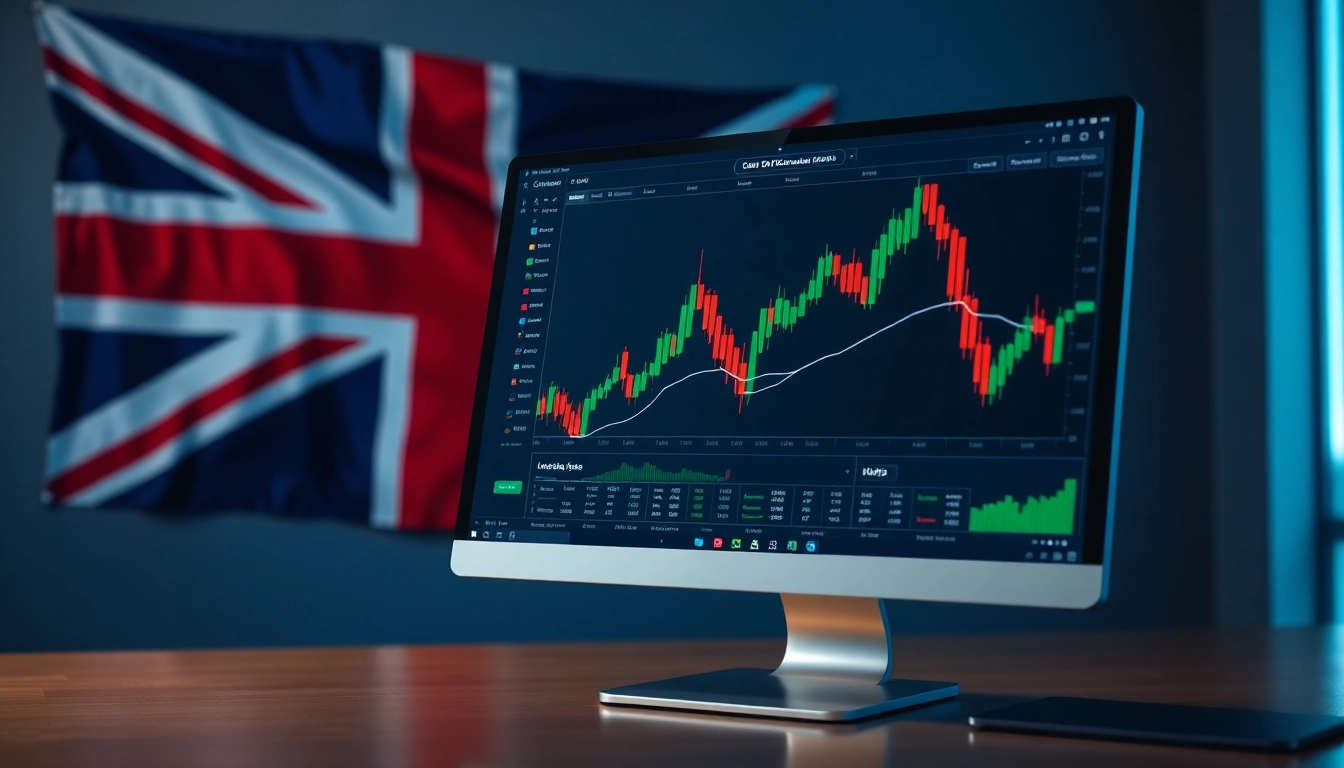Understanding the Basics of Online Trading in the UK
Online trading has revolutionized the way individual investors participate in financial markets. With the advent of sophisticated trading platforms, UK investors now have unprecedented access to stocks, forex, commodities, cryptocurrencies, and other financial instruments—all from the comfort of their homes or on the go. For those new to the scene, understanding what online trading entails is essential for making informed decisions and building a successful trading journey.
At its core, Online Trading UK involves buying and selling financial assets through digital platforms provided by brokerages or trading firms. Unlike traditional trading, which often required physical interactions or phone-based orders, online trading leverages internet technology to facilitate swift and transparent transactions. Traders can execute trades in real-time, access market data instantly, and manage their portfolios efficiently.
What is Online Trading and How Does it Work?
Online trading in the UK functions via online brokerage accounts, where traders place orders through trading platforms—either desktop software or mobile apps. These platforms connect traders with global financial markets, enabling them to buy or sell assets such as stocks, ETFs, options, forex, or cryptocurrencies. The process involves analyzing market data, making strategic decisions, and executing trades—all within seconds.
Most online brokers offer a range of tools including charting software, technical indicators, news feeds, and demo accounts for practice. Market participants can place various order types such as market orders, limit orders, and stop-loss orders, which help manage risk and optimize trading outcomes. Effective use of these features allows traders to adapt swiftly to market fluctuations and seize opportunities.
Key Benefits of Trading Platforms for UK Investors
Trading platforms serve as the backbone of online trading, providing numerous advantages:
- Accessibility: Trade from anywhere with internet access on PCs, tablets, or smartphones.
- Speed and Efficiency: Execute trades within milliseconds, enabling quick responses to market movements.
- Analytical Tools: Advanced charting, analytical indicators, and alerts to support informed decision-making.
- Cost-Effectiveness: Many platforms offer low or zero commission trades, reducing costs for active traders.
- Variety of Markets: Access to multiple asset classes and international markets from a single interface.
Regulatory Environment and Investor Protection in the UK
The UK’s financial markets are regulated by the Financial Conduct Authority (FCA), which ensures that brokers and trading platforms operate with integrity, transparency, and accountability. FCA authorization provides a layer of protection for investors, including segregation of client funds, complaint resolution mechanisms, and adherence to strict operational standards.
Before choosing a platform, traders should verify its FCA registration, reviews, and reputation in the market. Being compliant with UK regulations assures traders that their interests are safeguarded and that the platform adheres to industry best practices.
Choosing the Right Online Trading Platform in the UK
Top Features to Look for in a UK Trading Platform
Selecting an optimal trading platform involves evaluating several critical features:
- User Interface: An intuitive and easy-to-navigate interface reduces learning curves and enhances trading efficiency.
- Trading Costs: Competitive spreads, low commissions, and transparent fee structures.
- Order Types & Execution: Support for various order types with fast execution speeds to manage different trading strategies.
- Educational Resources: Access to tutorials, webinars, and market analysis for continuous learning.
- Customer Support: Responsive assistance through multiple channels, including live chat, email, and phone.
- Security Measures: Robust encryption, two-factor authentication, and regulatory adherence for safe trading environments.
Comparison of Popular UK Trading Platforms
Popular platforms for UK traders include:
- Trading 212: Ideal for beginners with commission-free trading, fractional shares, and an intuitive UI.
- IG: Known for advanced analysis tools and extensive market access, suitable for day traders and professionals.
- Interactive Brokers: Offers comprehensive global coverage and professional-grade tools for active traders.
- Freetrade: Zero commission trading with a focus on simplicity, perfect for casual investors and newcomers.
- eToro: Social trading features allow copying top investors’ portfolios, making it attractive to social traders and beginners alike.
How to Select a Platform that Fits Your Trading Style
Understanding your trading objectives and risk appetite is crucial. For example:
- If you’re a beginner seeking straightforward access, options like Freetrade or Trading 212 offer simplicity and zero commission trading.
- Active traders demanding advanced tools and quick execution might prefer IG or Interactive Brokers.
- For those interested in social or copy trading, eToro provides a community-driven platform with extensive asset options.
Always test platforms via demo accounts before committing real funds, and consider factors such as customer support quality, platform stability, and regulatory compliance in your decision-making process.
Effective Strategies for Trading Successfully in the UK Market
Technical vs Fundamental Analysis for UK Traders
Successful trading often hinges on employing the right analytical approach:
- Technical Analysis: Focuses on historical price patterns, chart indicators, and trend analysis to forecast short-term market movements. Essential for day trading and swing trading.
- Fundamental Analysis: Involves evaluating economic indicators, company financials, economic policies, and geopolitical events to assess long-term value. Suitable for investors with a buy-and-hold approach.
Most traders combine both approaches to develop comprehensive trading setups tailored to market conditions.
Risk Management and Stop-Loss Techniques
Risk management is vital to protect capital and ensure longevity in trading:
- Position Sizing: Limit exposure per trade based on account size.
- Stop-Loss Orders: Predetermined exit points to minimize losses when the market moves against expectations.
- Risk-Reward Ratio: Aim for trades where potential profit justifies the risk, commonly 2:1 or higher.
- Diversification: Avoid over-concentration in single assets or sectors, reducing systemic risk.
Building a Consistent Trading Plan
A solid trading plan involves setting clear goals, defining entry and exit criteria, and maintaining discipline. Essential steps include:
- Analyzing market conditions thoroughly before entering trades.
- Recording all trades to review performance and identify patterns.
- Sticking to predefined risk limits and avoiding emotional trading.
- Continuously learning from both successes and failures to refine strategies.
Advanced Online Trading Techniques and Tools
Utilizing Trading Bots and Automation in the UK
Automation is transforming trading efficiency. Algorithms and trading bots can execute complex strategies automatically, removing emotional biases. Benefits include consistent execution, backtesting capabilities, and 24/7 operation—especially critical in forex or cryptocurrencies.
Leveraging Real-Time Data and Market News
Market awareness is pivotal. Platforms offering real-time quotes, news feeds, and economic calendars help traders react swiftly to events such as UK GDP reports or Brexit developments, enabling timely trades and better risk management.
Optimizing Your Trading Platform for Better Performance
Ensure your setup includes high-speed internet, reliable software, and hardware. Customizing layouts, setting alerts, and automation scripts can significantly enhance efficiency and responsiveness during volatile market conditions.
Performance Metrics and Improving Your Trading Results
Tracking and Analyzing Your Trading Performance
Using trading journals, summary reports, and analytics tools help identify strengths and weaknesses. Regular review ensures continuous improvement and adaptation to evolving markets.
Adjusting Strategies Based on Data Insights
Data-driven insights facilitate strategic refinements, such as altering risk parameters, trading times, or asset focus based on performance metrics.
Staying Educated and Updated with Market Trends
Participate in webinars, follow industry news, and join trading communities to stay informed about market developments and new techniques. Education is ongoing; staying current enhances adaptability and resilience.



